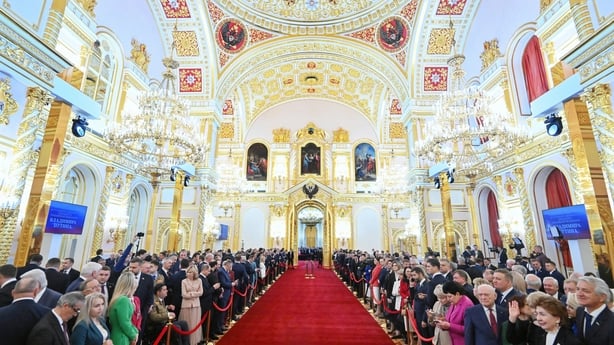Vladimir Putin has said Russia would emerge from the current "difficult" period victorious and stronger, as he took power for a record fifth presidential term.
"We will pass through this difficult, decisive period with dignity and become even stronger," Mr Putin said at his inauguration ceremony at the Kremlin, attended by an AFP journalist.
"We are a united and great nation," he said in an upbeat speech, to applause from an audience of around 2,500 people including officials and military top brass.
"Together we will overcome all obstacles, achieve everything we have planned, and together we will win," he said.
He said after being sworn into office that he viewed the presidency as a "huge honour, responsibility and sacred duty".
He vowed to ensure "sustained and stable development, unity and independence of the country".
Mr Putin thanked soldiers taking part in what Russia calls a "special military operation" in Ukraine, more than two years after it began on 24 February, 2022, at a ceremony attended by some of those fighting.
"We are looking forward confidently," Mr Putin stressed in his speech, which was aired on national television.
Evoking the country's "thousand-year history" as he spoke in the Kremlin's gilded St Andrew's Hall, the president said that present-day Russians owed a debt to previous generations who achieved "such triumphs that inspire us today".
He said Russians shared a "firm conviction that we ourselves alone will determine the fate of Russia for the sake of present and future generations".
Russia is "not refusing dialogue with western states" and is ready to talk about "questions of security and strategic stability", Mr Putin said, "but only on equal terms, respecting the interests of each other".
As he took the oath, he said that Russia did not rule out dialogue with the West but it needed to be on equal terms.
In the short speech, Mr Putin also said that Russia was open to developing relations with other countries he described as "the world's majority".
Russia's state system must be resistant to any threats and challenges, he said.
At 71, Mr Putin dominates the domestic political landscape.
On the international stage, he is locked in a confrontation with Western countries he accuses of using Ukraine as a vehicle to try to defeat and dismember Russia.
"For Russia, this is the continuation of our path, this is stability - you can ask any citizen on the street," Sergei Chemezov, a close Putin ally, told Reuters before the ceremony.
"President Putin was re-elected and will continue the path, although the West probably doesn't like it. But they will understand that Putin is stability for Russia rather than some sort of new person who came with new policies - either cooperation or confrontation even," he said.

Mr Putin in March won a landslide victory in a tightly controlled election from which two anti-war candidates were barred on technical grounds.
His best-known opponent, Alexei Navalny, died suddenly in an Arctic penal colony a month earlier, and other leading critics are in jail or have been forced to flee abroad.
The United States and other Western countries stayed away from the inauguration ceremony.
"No, we will not have a representative at his inauguration," Matthew Miller, a US State Department spokesperson, said.
"We certainly did not consider that election free and fair but he is the president of Russia and he is going to continue in that capacity."
Britain, Canada and most European Union nations also decided to boycott the swearing-in, but France said it would send its ambassador.
Ukraine said the event sought to create "the illusion of legality for the nearly lifelong stay in power of a person who has turned the Russian Federation into an aggressor state and the ruling regime into a dictatorship."

